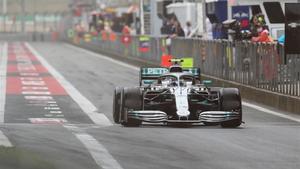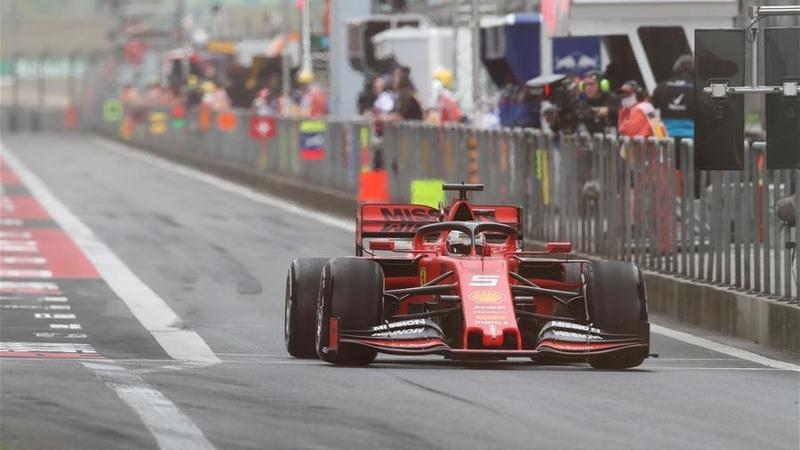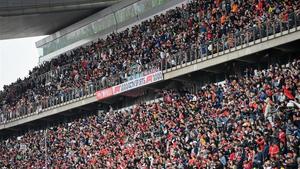 Mercedes driver Valtteri Bottas of Finland steers his car during the Formula One Chinese Grand Prix in Shanghai, China, on April 14, 2019. (DING TING / XINHUA)
Mercedes driver Valtteri Bottas of Finland steers his car during the Formula One Chinese Grand Prix in Shanghai, China, on April 14, 2019. (DING TING / XINHUA)
BEIJING - With the global COVID-19 pandemic having halted almost all competitive sport so far in 2020, much attention has turned to when competition might reasonably resume.
Motorsport has been equally affected by the global pause on everyday life, and as the Formula 1 fraternity wrestles with waves of cancellations and postponements, how might the 2020 F1 season now proceed?
Originally slated to contain a record 22 races, the 2020 campaign has seen its first eight events either canceled or postponed, with the season placed on indefinite hiatus.
Originally slated to contain a record 22 races, the 2020 campaign has seen its first eight events either canceled or postponed, with the season placed on indefinite hiatus
ALSO READ: McLaren to put staff on furlough, F1 drivers take pay cut
As things stand, the first race of 2020 will be the Canadian Grand Prix on June 14, though this timeframe appears optimistic, especially given the postponement of the 2020 Olympic Games originally set to open on July 24.
Assuming that F1 will not be in a position to resume until then, that would leave the British Grand Prix on July 19 as the first of an 11-race season.
F1 regulations decree that a season must contain at least eight races to be granted world championship status, so even this hugely truncated version of the campaign would still carry the necessary weight in the record books.
However, perhaps mindful of the financial implications of such a curtailed season, F1 boss Chase Carey has expressed hope that the 2020 season will involve between 15 to 18 races. This would likely take into account the rescheduling of earlier postponed rounds and a possible extension of the season into January 2021.
With this in mind, could it be that 2020 may yet see a Chinese Grand Prix? Perhaps. The Shanghai-based race was the first of the 2020 F1 season to be called off back in February, as China grappled with the emerging COVID-19 epidemic.
 Ferrari driver Sebastian Vettel of Germany steers his car during the Formula One Chinese Grand Prix in Shanghai, China, on April 14, 2019. (DING TING / XINHUA)
Ferrari driver Sebastian Vettel of Germany steers his car during the Formula One Chinese Grand Prix in Shanghai, China, on April 14, 2019. (DING TING / XINHUA)
But while cases of coronavirus continue to rise across F1's traditional European heartland, China is now in a state of recovery, with coronavirus cases falling and shops, restaurants and schools beginning to reopen.
Reports in the British media last week suggested that the Shanghai International Circuit, which hosts the Chinese GP, is now semi-operational, with a round of the China GT championship tentatively scheduled to be held at the track on June 26.
Though the chilly Shanghai winter may prevent a Grand Prix being held there between November and January, the unprecedented nature of the 2020 season will likely see races being rescheduled much more freely than in a regular year, and F1 teams have waived their rights to consultation on any changes.
 Fans watch the Formula One Chinese Grand Prix in stands in Shanghai, China, on April 14, 2019. (DING TING / XINHUA)
Fans watch the Formula One Chinese Grand Prix in stands in Shanghai, China, on April 14, 2019. (DING TING / XINHUA)
The Chinese Grand Prix has been ever-present on the F1 calendar since 2004, and a rescheduling of the 2020 race would make much sense for a sport eager to increase its presence in the world's most populous country.
READ MORE: Formula 1 uses break from racing to join UK's virus battle
F1's former commercial director Sean Bratches revealed last April that talks were ongoing with several cities about holding a second Grand Prix in China, and the sport has also revealed plans to open a dedicated office in the capital Beijing.
And while F1's first priority will doubtless be ensuring that the season can eventually begin when it is safe and convenient to do so, the notion of a Chinese Grand Prix in 2020 may yet become a reality.



